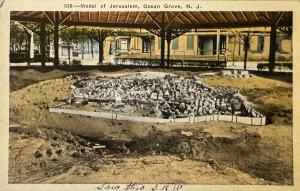 Some fears are warranted. Others are not. In a society saturated with fear and inundated with images and soundbites that create this fear, it has become increasingly difficult to differentiate between the two.
Some fears are warranted. Others are not. In a society saturated with fear and inundated with images and soundbites that create this fear, it has become increasingly difficult to differentiate between the two.
I don’t pretend to know how to do so. I don’t have a golden rule or foolproof equation that I apply to discern what is genuinely fearsome and what is a media creation. I occasionally suffer from the same paralyzing fear that grips many others whenever there is the announcement of a red terror alert, an attack of African killer bees or the emergence of a new strand of the flu. But this temporary fear, and the immobility it creates, serves only to harden my resolve to understand and move past my fears.
Fear breeds anxiety, and when public discourse is overrun by disquiet and tension, prejudice often gets the better of people. In the face of such illogical and debilitating fear, it’s impossible to live and learn.
So, in response to what I perceive as unwarranted fear, I have dedicated this column to shedding new light on the pervasive fear of anti-Semitism on campus. I would not presume to try to alleviate all of your concerns about the trend. If students at Carleton and York universities and the University of Western Ontario are concerned about it, it’s with good reason. I’m merely going to share with you my modest experiences so far in Halifax in the hope they will provide a new perspective on the issue and let you decide for yourself.
I am a Jewish student on a university campus and I have never been the target of anti-Semitism – shocking, I know. I have never been shouted down in class for my political or religious beliefs. A professor has never belittled my opinions. I’ve never been called racist, colonialist or fascist. And I’ve never seen or heard Judaism, or any religion for that matter, seriously defamed in an academic setting.
To be fair, Dalhousie University is not the University of California at Berkeley or Columbia University. It’s not even McGill University or the University of Toronto. Dalhousie seems palpably apathetic toward politics in general and contentious issues in particular (voter turnout for our student elections is even lower than for federal votes).
Dalhousie’s Jewish students haven’t been afflicted by what historian Irving Abella – who specializes in the history of Jews in Canada – has described as a traumatizing anti-Semitism on campus that intimidates students from speaking up in support of Israel or Judaism.
Contrary to what many may think is possible, I’ve had a university experience in which not only have my religious, political and cultural opinions been aired, they have been fostered and encouraged to grow and diversify as well.
There are near-weekly Shabbat dinners hosted by either the local Chabad or the Jewish Student Association, and on the off week, if a student is really in need of a home-cooked Shabbat meal, the rabbi can usually set them up with a welcoming family. There are theme parties and events, such Purim Palooza and challah baking. And to show that us Jews aren’t all about having a good time, there are charity events to raise money for deserving causes.
But more important than the dinners, parties and events is the open dialogue on campus that’s fostered by scholars, journalists and historians. This past month alone, the Dalhousie’s Israel Action Committee hosted Noam Bedein, a photojournalist and director of the Sderot Media Centre, and Dalhousie’s debating society held an open forum on the Israeli-Palestinian conflict.
Granted, there have been a few instances of heated friction, most notably when I was in first year, when the Palestinian Solidarity Society erected an apartheid wall in the student union building. But despite differing opinions, the Palestinian demonstrators and the pro-Israel activists who questioned them found enough common ground to discuss the Mideast situation and possible resolutions without resorting to altercations and arguments.
Far from being in an atmosphere of virulent anti-Semitism couched in anti-Zionist terms – as some Jewish groups warn that university campuses are fast becoming – I have found my university experience to be one in which a multitude of opinions are encouraged and fostered.






